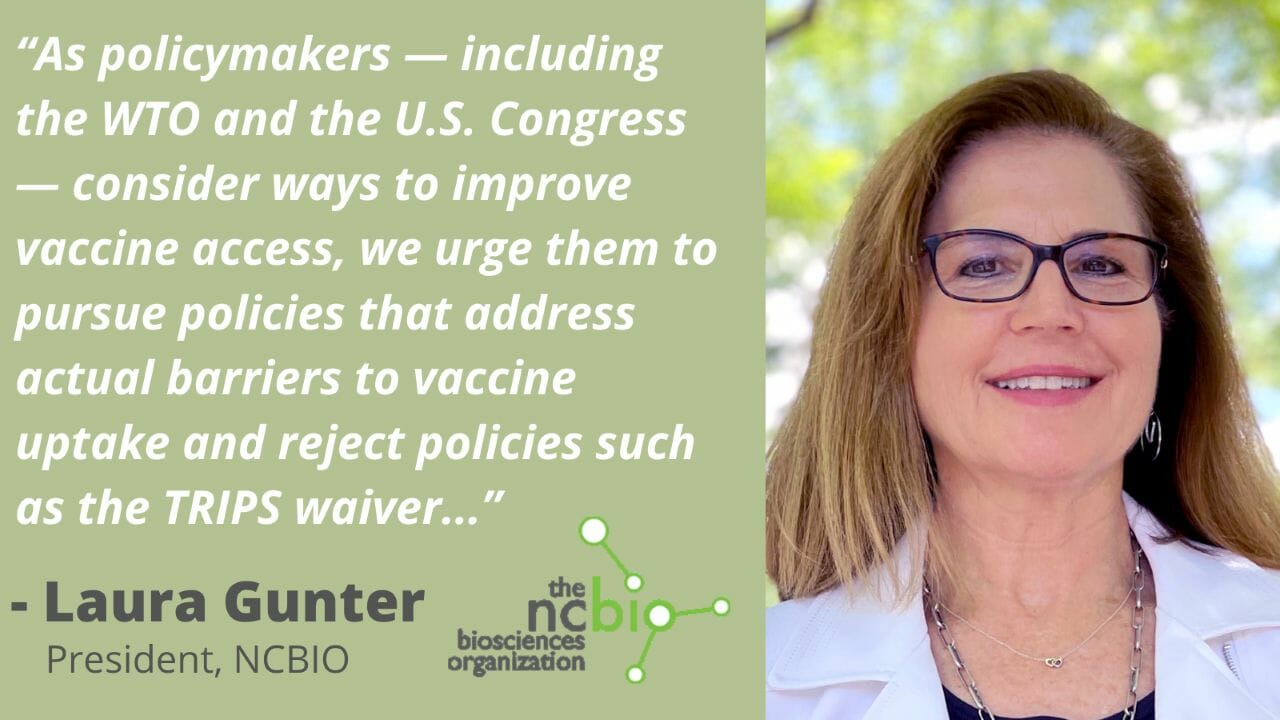Laura Gunter: Biotech policies should protect patients, innovation

The ongoing response to the COVID-19 pandemic has highlighted the critical role of the North Carolina life sciences industry in battling our most serious public health threats. When faced with the threat of COVID-19, biotechnology companies — many based right here in North Carolina — answered the call and quickly developed safe and effective vaccines, tests and treatments. Increasing vaccination rates — both in the U.S. and abroad — and continuing to invest in innovation remains a priority for the North Carolina life sciences ecosystem. Unfortunately, policymakers are currently considering proposals that will hamper our ability to effectively respond to COVID-19 and future pandemics.
The World Trade Organization is an international body that helps regulate international trade. When the WTO meets later this month, one of its priorities will be helping to ensure equity in vaccine access for developing countries. One of the proposals WTO will consider is the Trade Related Aspects of International Property Rights, or TRIPS, waiver of intellectual property protections for COVID-19 vaccines, which would allow manufacturers and developers in other countries to make and sell the patented products of American companies.
Although the decision about whether or not to remove legal protections from American companies will be made halfway around the world, there will be significant consequences for all North Carolinians. Ensuring equitable distribution and access to the COVID-19 vaccines in other countries is critical to stopping the spread of the pandemic. Allowing the virus to thrive in other countries creates more opportunities for variants to emerge and end up infecting people here. However, there is no evidence that these IP protections are currently a barrier to vaccine uptake.
But what we know will happen if WTO removes IP protections for COVID-19 vaccines is a decrease in innovative treatments and cures. Removing IP protections removes the financial incentive for biopharmaceutical manufacturers to collaborate with other industry members and the U.S. government which is key to successful vaccine development. In addition, removing legal protections for these vaccines sets a dangerous precedent for future research and development of treatments for diseases affecting many North Carolinians and their families, including cancer, arthritis, multiple sclerosis, Alzheimer’s disease and many other chronic, rare, and life-threatening illnesses. North Carolina companies will not only have fewer resources to invest in innovative research, but they will also be less likely to take on risky research if there are no protections in place to help them recoup their investment once products make it to market. Needed venture capital won’t flow to an industry where the risk is so high without clear reward opportunity.
Without IP protections in place, North Carolina companies will lose incentives to innovate along with the capital and support needed for research, development and commercialization for the latest medications, technological advances, and more. North Carolina is one of 15 states across the country that generates between $5 billion to $15 billion per year in research and development. In addition, our state is home to three tier 1 research universities, and more than 600 life science companies employing over 60,000 North Carolinians. Impressively, our state is one of the biggest contributors nationally towards research and development. However, to continue that work, we need support from federal legislators.
Vaccines are one of the greatest public health tools we have to stop the spread of infectious diseases and ensuring global access to the COVID-19 vaccines is critical to stopping the spread of the pandemic. As policymakers — including the WTO and the U.S. Congress — consider ways to improve vaccine access, we urge them to pursue policies that address actual barriers to vaccine uptake and reject policies such as the TRIPS waiver that threaten the North Carolina life sciences ecosystem, which is a major jobs driver in the state, and which will be at the forefront of combating the next pandemic that we face.
